#Jo Beverley
Explore tagged Tumblr posts
Text
Since we’re visiting family in Chicagoland anyway, I took a side trip to Love’s Sweet Arrow bookstore in Tinley Park and found one of my Holy Grail books: Irresistible Forces, a fantasy and science fiction romance anthology that features stories by Jo Beverley, Lois McMaster Bujold, Mary Jo Putney, and Jennifer Roberson. All in the same book! I’m WAY too excited to have finally found it.

#jo beverley#lois mcmaster bujold#mary jo putney#jennifer roberson#catherine asaro#deb stover#fantasy romance short stories#science fiction romance short stories#love’s sweet arrow (Chicagoland)#bookstore finds#romance novel recs#romance novel blogging
5 notes
·
View notes
Text
My reading pile update into the new year
My reading pile update into the new year
A reading pile update for my fans. I am not always writing, and those days of the new year, I am currently reading five very disparate novels. Two SF Canadian authors first: Den Waldron’s Axis of Andes for the historical context of south America before WWII, and The Nightingale’s Tooth by Sally McBride, a fantasy novel set in an historical uchrony. Progressing through Joyce Carol Oates, A Book of…

View On WordPress
#Canadian authors#Den Waldron#Historical uchrony#Jo Beverley#Joyce Carol Oates#Reading pile update#Regency romance#Sally McBride#V. S. McGrath#Weird western
0 notes
Text
How much of the Stark stuff in ASOIAF is just the Little House books, specifically The Long Winter?
#this is not an accusation of plagiarism#but I do think it’s funny because they are not one bit medieval and they are ‘girl books’#so people are less likely to see it#I’m also pretty sure that jo beverley’s medieval-set romance novels of the early nineties were an influence#grrm even edited an anthology with one of her stories
2 notes
·
View notes
Text
Regulus black, Remus lupin, Abed Nadir, Annie Edison, Luna Lovegood, Chandler Bing, Number 5, Rosalie Hale, Beverley Marsh, Richie Tozier, Jo March, Amy March, Amy Dunne, Nick Miller, Robin Buckley, Steve Harrington, Klaus Hargreeves, Will Grahm, Just like me frfr
#maurauders era#regulus black#remus lupin#community#abed nadir#annie edison#luna lovegood#friends#chandler bing#umbrella academy#number 5#klaus hargreeves#Twilight#rosalie hale#it movie#beverley marsh#richie tozier#little women#jo march#amy march#gone girl#amy dunne#new girl#nick miller#stranger things#robin buckley#steve harrington#hannibal#will grahm
6 notes
·
View notes
Text
MINOR SPOILERS FOR: How The Beverley Hillbillies Changed TV
reblog for bigger sample :)
#quinton reviews#beverly hillbillies#how the beverly hillbillies changed tv#petticoat junction#henningverse#april fool's day
295 notes
·
View notes
Text
British Titles
I usually don't share posts of this type, but I've taken the liberty of doing so because I've read several fanfics and seen too many posts both here and on TikTok, in which it's more than evident that many people don't know how British noble titles worked in the 18th and 19th century. This is something I've seen more in the Bridgerton fandom, but many content creators or writers from other fandoms have made the same mistakes when interpreting noble titles.
First of all, I would like to clarify something. English and British noble titles are not exactly the same, although they are related. The following explains the difference and the historical context:
Historical Context.
England:
Before the formation of the United Kingdom, England had its own system of noble titles.
Titles such as duke, marquess, earl, viscount, and baron were common.
2. Great Britain:
In 1707, with the Act of Union, England and Scotland united to form the Kingdom of Great Britain.
After this union, noble titles became titles of the Kingdom of Great Britain.
3. United Kingdom:
In 1801, with the incorporation of Ireland through the Act of Union, the Kingdom of Great Britain became the United Kingdom of Great Britain and Ireland.
This further expanded the scope of noble titles.
Noble Titles.
Despite these political changes, the titles themselves (duke, marquess, earl, viscount, baron) remained consistent in terms of hierarchy and honor. The main difference was the realm and origin of the title:
English Titles:
Referred specifically to those created in the Kingdom of England before 1707.
Examples: Duke of Norfolk, Marquess of Winchester, Earl of Derby.
2. British Titles:
Refers to those created after 1707 in the Kingdom of Great Britain and later in the United Kingdom.
Examples: Duke of Marlborough, Marquess of Rockingham, Earl of Chatham.
Differences and Similarities.
Similarities:
The hierarchy and responsibilities of the titles remained the same, regardless of the change in the kingdom's designation.
Titles granted by the British crown maintained the same forms of address and privileges.
2. Differences:
British titles cover a broader scope, including Scotland and Ireland (later Northern Ireland).
English titles were specific to the Kingdom of England before the formation of Great Britain.
In short, while English and British noble titles are part of the same hierarchy and nobility system, the main distinction lies in the political and historical context in which they were created. During the 18th and 19th centuries, this difference was based on whether the titles originated before or after the unions that first formed Great Britain and later the United Kingdom.
Now then, with that said, I want to mention that my main reference for this is the article 'ENGLISH TITLES IN THE 18TH AND 19TH CENTURIES' by Jo Beverley, who is a Member of the RWA Hall of Fame for Regency Romance. Here is the link if you want to read the original article: On Titles (jobev.com)
It is also important to mention that, as Jo Beverley said, this brief run-down of English titles is for use by fiction writers. It is by no means comprehensive, but covers the more common situations arising in novels set in the above periods.
Now, the peerage basically runs according to primogeniture, ie the eldest son gets nearly everything. If a peer has no eldest son, the title and possessions that belong to it go to the next male heir, probably a brother or nephew.
There are a very few titles that can pass to a female if there is no direct heir, but they will revert to the male line when the lady bears a son. (Such as the monarchy.) Some titles can automatically pass through a female heir (when there is no male heir) and most can be revived by subsequent generations by petitioning to the Crown. But that's getting into more complicated areas. If your plot depends on something unusual, please do research it thoroughly before going ahead.
As Beverley said, this is a bit more complicated and requires further research if it's something you wish to incorporate into your work, especially if it's set in the 18th or 19th centuries. In the 20th century, this was more common. A clear example would be Lord Mountbatten (1st Earl Mountbatten of Burma), who had no sons, only two daughters. Therefore, he passed his title to his firstborn, Patricia Knatchbull (née Mountbatten). Thanks to this title, the Countess was entitled to a seat in the House of Lords, where she remained until 1999, when a House of Lords Act removed most hereditary peers from the chamber.
But returning to the main topic, the eldest son is called the heir apparent, as he is undoubtedly the heir. If there is no such son, the next in line is called the heir presumptive because, however improbable (such as the duke being on his deathbed), there remains a possibility of a closer heir being born. Therefore, an heir presumptive does not hold the title of heir, if there is one. (See below about heir's titles.)
If a peer dies leaving a wife but no son, the heir inherits unless the widow says she might be with child. It is for her to do that. If she stays silent, it is assumed that she is not. If she's pregnant, everything waits until the child is born.
These last two paragraphs can be perfectly illustrated by an example that many know. In 'When he was wicked', after the death of John Sterling, Earl of Kilmartin, Michael Sterling is not immediately named as the new Earl upon his cousin's death, as Francesca announces her pregnancy. But since she had a miscarriage, there was no longer a possible heir to the late Earl of Kilmartin, and therefore, the title is immediately inherited by Michael.
Continuing with the main topic, an heir must be legitimate at birth to inherit a title, though that could mean a marriage ceremony performed while the mother is in labor. A peer may raise bastards with devotion and/or marry the mother later, but a bastard child can never be his legal heir.
It's also crucial to mention that peers automatically had seats in the House of Lords. Note, however, that courtesy titles (those held by heirs) do not give seats, or any of the other privileges of the peerage.
Something else that is highly important to clarify, as confusion is quite common, is that most peers do not use their surnames as their title. Thus, the usual pattern would be something like Sebastian Burgoyne, Earl of Malzard. He is Lord Malzard NEVER Lord Burgoyne. (Or, for that matter, Lord Sebastian.) As an author, you might like variety, but take as a general rule is that no one ever had two forms of address.
THE RANKS OF THE PEERAGE
Duke.
Leaving aside royalty, this is the highest rank. His wife is the Duchess. They will be duke and duchess of something.
If we use the famous main couple from Bridgerton Season 1, the example would be: Duke and Duchess of Hastings. Address is "Your Grace", though familiars may address them just as Duke and Duchess. Like, "Fine weather for shooting, eh, Duke?" or may address the duke by title. "Care for more port, Hastings?"
The duke will also have a family name, that is, a surname, but he will not use it in the normal course of events. And something crucial that is also commonly confused, the duchess does NOT use the surname at all. Continuing with the same example, if Daphne Bridgerton marries the Duke of Hastings (whose surname is Basset), she will be the Duchess of Hastings and will informally sign as Daphne Hastings, NEVER as Daphne Basset.
The duke's eldest son is his heir and will have his father's second-best title as his courtesy title. Nearly all peers have a number of titles marking their climb up the ranks. The heir to a duke is often the next lowest ranking peer, a marquess, but the title could, however, be an earldom, or even a viscountcy. For example, the eldest son of Daphne and Simon, the Duke and Duchess of Hastings, holds the courtesy title that his father had when the Late Duke of Hastings was still alive: Earl of Clyvedon.
Important note, a courtesy title does not give the holder a seat in the House of Lords or other privileges of the peerage.
If the heir has a son before the heir becomes duke, that son will take the next lowest title as a courtesy title. If the heir dies before his father, his eldest son becomes the heir apparent and takes his father's title.
Apart from the heir, a duke's sons are given the courtesy title Lord with their Christian name. (Lord + firstname + surname). Continuing with the example of the Duke and Duchess of Hastings, assuming that like in the book, they also have David and Edward in the series, their courtesy titles would be: Lord David Basset and Lord Edward Basset. They are NEVER Lord Basset or Lord David Hastings and Lord Edward Hastings.
All duke's daughters are given the courtesy title (Lady + firstname + surname). And continuing with the same example, the daughters of the Duke and Duchess of Hastings, Belinda and Caroline, would be: Lady Belinda Basset and Lady Caroline Basset. Also, they are NEVER Lady Basset or Lady Belinda Hastings and Lady Caroline Hastings.
And also, if they marry a commoner, they retain the title. Let's say Lady Belinda marries Mr. Sticklethwait, she becomes Lady Belinda Sticklethwait. But if she marries a peer, she adopts his title. If Lady Belinda marries the Earl of Herrick, she becomes Countess of Herrick, Lady Herrick. And if she marries the holder of a courtesy title, then she may use his title or her birth title as she wishes.
I make this clarification because it's the most common mistake in these types of novels. Note that in all cases, titles like Lord or Lady with both first and surname (eg. Lady Anne Middleton) and Lord or Lady "last name" or "title" (Lady Middleton) are exclusive. No one can be both at the same time. Moreover, Lord or Lady "firstname" is a title conferred at birth. It CANNOT be gained later in life except when the father accedes to a title and thus raises his family.
So, Lady Mary Smith is not Lady Smith and vice versa. Lord John Brown in not Lord Brown and vice versa. If Mary Smith marries Lord Brown she becomes Lady Brown, NOT Lady Mary. (If she marries Lord John Brown, she becomes Lady John Brown. Yes, it may sound odd to modern ears, but the past is, as they say, a different country. That's the charm of historical fiction.)
Marquess.
This is the next rank. (As above, it can be spelled marquis or marquess, but in either case is pronounced markwess.)
Similar to the duke, he will be the Marquess of something, for example: He is Richard Byron, the Marquess of Salisbury, or Lord Salisbury, or simply Salisbury to his family. His wife is the Marchioness of Salisbury or Lady Salisbury. She would sign with her firstname and title, for example: Diana Salisbury, NEVER Diana Byron.
His heir apparent takes his next highest title as a courtesy title (eg. Earl of Cranborne). All other sons have the title of Lord with their first and surname (eg. Lord Arthur Byron and Lord Albert Byron, NEVER Lord Byron or Lord Arthur Salisbury and Lord Albert Salisbury). All daughters have the title of Lady with their first and surname (eg. Lady Alexandra Byron and Lady Amelia Byron, NEVER Lady Byron or Lady Alexandra Salisbury and Lady Amelia Salisbury).
Earl.
He will nearly always be earl of something. His wife is the Countess. If we take another famous couple from Bridgerton, they would refer to him as "the Earl of Kilmartin" or "Lord Kilmartin," or simply "Kilmartin" among family. His wife will be the Countess of Kilmartin or Lady Kilmartin, and she will sign as Francesca Kilmartin. In the same way as with the wife of a duke or marquess, considering that the Earl of Kilmartin is named John Stirling, Francesca will NEVER be called Francesca Stirling. That's why in the series, when she introduces herself to Michaela, she says that her name is now Kilmartin and NOT Stirling.
It's important to mention that some Earls do not use 'of' like Earl Spencer, and in that case, the family surname is the same as the title (following the previous example, the surname would be Spencer), but this is quite unusual and I think it should be avoided in fiction unless it's a crucial plot point.
As with a duke or marquess, the earl's heir will take the next lowest title as a courtesy title, and the heir's son, the next again. Continuing with the example of the Kilmartins, it's not very clear what the courtesy title for John Sterling II (son of Francesca and Michael in the books) is, but if Michael Sterling is the Earl of Kilmartin and has a subsidiary title of Viscount, then their eldest son, John Sterling II, would use the courtesy title of Viscount Glenmore or Lord Glenmore. If there is no specific subsidiary title, then the eldest son would simply be known as Lord John Stirling.
All the daughters of an earl are given the courtesy title: Lady + their first name. Again, using the Kilmartins as an example: Lady Janet Stirling and NEVER Lady Janet Kilmartin. Younger sons of an earl, however, are merely "The Honorable" which is not used in casual speech. So, assuming in the books Michael and Francesca had another son, for example, Michael Stirling II, he would simply be The Honorable Michael Stirling, but in casual speech, he would simply be referred to as Mr. Michael Stirling or just Mr. Stirling.
Viscount.
His wife is a Viscountess. He will not use 'of'. He will be, for example, Viscount Bridgerton, usually known as Lord Bridgerton, or just Bridgerton. His wife will be known as Lady Bridgerton and will sign herself Kathani Bridgerton.
His heir has no special title. All children are known as "The Honorable". Continuing with the example of the Viscount and Viscountess Bridgerton, their children would be called:
*The Honorable Edmund Bridgerton, and simply be referred to as Mr. Edmund Bridgerton.
*The Honorable Miles Bridgerton, and simply be referred to as Mr. Miles Bridgerton.
*The Honorable Charlotte Bridgerton, and simply be referred to as Miss Charlotte Bridgerton.
*The Honorable Mary Bridgerton, and simply be referred to as Miss Mary Bridgerton.
Baron.
This is the lowest rank in the peerage. His wife is a Baroness. NOTE that the terms baron and baroness are only used in the most formal documents, or when the distinction has to be made elsewhere. General usage is simply to call them Lord and Lady.
She will sign with her name and title. The children are known as "The Honorable".
Using another character from Bridgerton, if we assume that Colin and Penelope Bridgerton's son is named Elliot, then Elliot Bridgerton, the new Lord Featherington, would sign as Lord Featherington and NEVER as Lord Bridgerton. Therefore, his wife would also sign with his title, that is, Featherington. For example, if the wife's name is Elizabeth, then she would be Lady Featherington and would sign as Elizabeth Featherington, and NEVER as Elizabeth Bridgerton or Lady Bridgerton.
Baronet.
The next in the ranking—and not of the nobility—is Baronet. A baronet is addressed as Sir + first name + surname. For example, using another couple from the Bridgerton universe, Sir Phillip Crane. His wife would be called Lady + surname. For example, Lady Crane and not Lady Eloise Crane unless she is the daughter of a duke, marquess, or earl (which is not the case). She would sign with her full name, as Eloise Crane.
His children have no special distinction. However, the title is inheritable. So, continuing to use Sir Phillip as a reference, when he dies, his baronetcy will pass to his eldest son Oliver, who will then be called Sir Oliver.
It's worth mention that although in the series Oliver is NOT Sir Phillip's biological son, he still married Marina before the birth of the twins and acknowledged them both as his own, so the baronetcy title will pass without any issue to Oliver. In the event that he did not acknowledge them as his children or that Sir Phillip and Marina married after the birth of the twins, then the title of Sir Phillip would pass to his next legitimate son, Frederick (son of Sir Phillip and Eloise in the books).
Knight.
A knight is essentially treated the same as a baronet, but with the difference that it is a lifetime title only. His wife will be Lady + surname.
OTHER MATTERS
Dowagers
When a titled lady is widowed she becomes a dowager, but the practice has generally been not to use that title until the heir takes a wife, since there can be confusion about who the true Lady Bridgerton is, for example.
And even if she has a daughter-in-law, in general usage she would still be referred to by the simple title unless there was likely to be confusion. So, if the Dowager Viscountess Bridgerton was at a house party while her daughter-in-law was in London, people would not be constantly referring to her as the Dowager Viscountess.
Female titles in their own right
There are a few, very few, titles that can pass to a daughter if there is no son, as in the Royal Family, for example. In this case, the usage is the same as if they were the wife of a peer of that rank, but their husband gains NO title from the marriage, just as the Duke of Edinburgh was not king.
A Peeress in her Own Right retains her title after marriage, and if her husband's rank is the superior one, she is designated by the two titles jointly, the inferior one last. Or she can say what form she wants to use. (eg The Marchioness of Rothgar is also the Countess of Arradale by right. She chooses to be Lady Rothgar and Arradale in the most formal situations, Lady Rothgar in general, but Lady Arradale in private, especially when attending to her duties as Countess of Arradale. Unusual situations do tend to get complicated.) Her hereditary claim to her title holds good in spite of any marriage, and will be passed on.
Since the husband gains no title from such a marriage, it's possible to have the Countess of Arbuthnot married to Mr. Smith.
Her eldest son will be her heir and take her next lowest title. If she has no son, her eldest daughter will be her heir, but until she becomes the peer she will hold only the title that comes from her birth — eg. Lady Anne — if any, because an eldest daughter is always an heir presumptive. There might still be a boy.
The most common errors observed in novels:
Interchanging courtesy titles like Lady Mary Smith and Lady Smith.
Interchanging peerage titles, as when Michael Downs, Earl of Rosebury is variously known as Lord Rosebury, Lord Downs, and Lord Michael Downs.
Applying titles that don't belong, as when Jane Potts marries Viscount Twistleton and erroneously becomes Lady Jane, a title form that can only come by birth.
Having the widow of just about anyone, but especially a peer, remarry before time has elapsed to be sure she is not bearing a child. Or rather, whose child it is that she bears!
Having the heir presumptive assume the title and powers before the widow has made it clear that she's not going to produce an heir.
Having an adopted son inherit a title. Legal adoption was not possible in England until the twentieth century, and even now an adopted son cannot inherit a title. Even if the son is clearly the father's offspring, if he wasn't born after a legal marriage, he cannot inherit the father's title. However, since they didn't have DNA testing, a child was assumed to be legitimate unless the father denied it from the first. Even if the son turns out to look suspiciously like the vicar, the father cannot deny him later. This, I assume was to avoid the chaos of peers coming up with all sorts of excuses to switch heirs on a whim.
Having a title left in a will, which follows from the above. A title cannot be willed to whomever the peer in question chooses. It goes according to the original letters patent, which almost always say that it will go to the oldest legitimate male in direct descent. The property can be left elsewhere, unless it is entailed, but the title goes by legitimate blood.
Having an heiress (ie a daughter without brothers) inherit a title and convey it to her husband. It could be done — anything could — by special decree of the Crown, but it was not at all normal.
Now, when you've arrived at the title you want to give your character, perform an internet search to see if it exists. You can also check The Peerage or do an advanced search on Google Books. You wouldn't want to give your fictional character a title that was already in use at that time. Additionally, some readers will be knowledgeable about the real nobility and it could disrupt the fictional reality you're trying to create.
If you really like the title but it already exists or existed, you can modify it while still retaining its appeal. For example, if Lord Amesbury exists, you could create Lord Aymesbury or Lord Embury. If your character's family has been in Suffolk for generations, names of places in Suffolk can provide ideas for names.
I hope this helps, although I'm sure it can be subject to debate and improvement.
#incorrect bridgerton quotes#bridgerton fanfiction#bridgerton incorrect quotes#bridgerton#cressida bridgerton#benedict bridgerton#eloise bridgerton#bridgerton season 3#bridgerton s3 part 2#bridgerton netflix#bridgerton season 3 spoilers#bridgerton memes#eloise bridgerton x yn#daphne bridgerton x reader#eloise bridgerton x reader#anthony bridgerton#colin x penelope#colin bridgerton#daphne bridgerton#francesca x michaela#francesca bridgerton#francesca x john#franchaela#gregory bridgerton#hyacinth bridgerton#kate bridgerton#kate sharma#kate sheffield#sophie beckett#cressida cowper
171 notes
·
View notes
Text










🌈 Queer Books Coming Out in March 2024 🌈
🌈 Good afternoon, my bookish bats! Struggling to keep up with all the amazing queer books coming out this month? Here are a FEW of the stunning, diverse queer books you can add to your TBR before the year is over. Remember to #readqueerallyear! Happy reading!
[ Release dates may have changed. ]
❤️ Shift: A Memoir of Identity and Other Illusions - Penny Guisinger 🧡 Tempting Olivia - Clare Ashton 💛 Monilinia - Free Mints 💚 Guillaume - Aurora Dimitre 💙 The Marble Queen - Anna Kopp & Gabrielle Kari 💜 The Baker & the Bard - Fern Haught ❤️ Rainbow! - Sunny & Gloom 🧡 The Safe Zone - Amy Marsden 💛 The Weavers of Alamaxa - Hadeer Elsbai 💙 The No-Girlfriend Rule - Christen Randall 💜 A Different Kind of Brave by Lee Wind 🌈 Cirque du Slay - Rob Osler ❤️ Wizard’s Debt - Niranjan 🧡 One Last Breath - Ginny Myers Sain 💛 Nothing Special - Katie Cook 💚 I Feel Awful, Thanks - Lara Pickle 💙 The Tower - Flora Carr 💜 Be the Sea - Clara Ward ❤️ What Grows in the Dark - Jaq Evans 🧡 Heirs of Bone and Sea - Kay Adams 💛 The Haunting of Velkwood - Gwendolyn Kiste 💙 Thunder Song - Sasha taqwšəblu LaPointe 💜 Mona of the Manor - Armistead Maupin 🌈 Like Happiness - Ursula Villarreal-Moura
❤️ Ellipses - Vanessa Lawrence 🧡 Saint, Sorrow, Sinner - Freydís Moon 💛 Blood & Brujas - Mikayla D. Hornedo 💚 Infinity Kings - Adam Silvera 💙 Really Cute People - Markus Harwood-Jones 💜 How You Were Born - Kate Cayley ❤️ These Bodies Between Us - Sarah Van Name 🧡 Icarus - K. Ancrum 💛 The Emperor and the Endless Palace - Justinian Huang 💙 How Not to Date an Angel - Lana Kole 💜 Enemy Colours - R.M. Olson 🌈 Broken Parts Included - Alyson Root
❤️ Who's Afraid of Gender? - Judith Butler 🧡 The Duke’s Cowboy - Andrew Grey 💛 The Secret Something - Emily Wright 💚 Colstead & Andie - Olivia Janae 💙 Play It Again, Ma’am - Sienna Waters 💜 Love Is…? - K.J. Wrights ❤️ Welcome to Forever - Nathan Tavares 🧡 Just Another Epic Love Poem - Parisa Akhbari 💛 The Phoenix Bride - Natasha Siegel 💙 These Letters End in Tears - Musih Tedji Xaviere 💜 Truly Home - J.J. Hale 🌈 Monster Mixer - Robin Jo Margaret
❤️ The House of Hidden Meanings - RuPaul 🧡 Promised to the Queen - Barbara Winkes 💛 A Conclave of Crimson - Nicole Eigener & Beverley Lee 💚 A Hunt of Blood and Iron - Cara Nox 💙 The Fealty of Monsters - Ladz 💜 Ariel Crashes a Train - Olivia A. Cole ❤️ Those Beyond the Wall - Micaiah Johnson 🧡 Dancing Toward Stardust - Julia Underwood 💛 Heir to Dreams & Darkness - Ben Alderson 💙 Comet Cruise - Niska Morrow 💜 Dead Girls Walking - Sami Ellis 🌈 Blackout - Carlos E. Rivera
❤️ Monster Crush - Erin Ellie Franey 🧡 Blessed Water - Margot Douaihy 💛 These Fragile Graces, This Fugitive Heart - Izzy Wasserstein 💚 Kiss of Seduction - Rawnie Sabor 💙 Sunbringer - Hannah Kaner 💜 Evacuation to Love - C.A. Popovich ❤️ Sin - Brooke Matthews 🧡 Falls from Grace - Ruby Landers 💛 Lean in to Love - Catherine Lane 💙 A Small Apocalypse - Laura Chow Reeve 💜 Cascade Failure - L.M. Sagas 🌈 The Mars House - Natasha Pulley
❤️ All This Time - Sage Donnell 🧡 The Romance Lovers Book Club - MA Binfield 💛 View from the Top - Morgan Adams 💚 Number Call - Nagisa Furuya 💙 Crossing Bridges - Chelsey Lynford 💜 The Boyfriend Subscription - Steven Salvatore ❤️ Love the World or Get Killed Trying - Alvina Chamberland 🧡 Synthetic Sea - Franklyn S. Newton 💛 The Prince & His Stolen Groom - J.E. Ridge 💙 Chrysalis and Requiem - Quinton Li 💜 Where Sleeping Girls Lie - Faridah Àbíké-Íyímídé 🌈 A Botanical Daughter - Noah Medlock
❤️ Wednesday Nights - by Donna Jay 🧡 The Woods All Black - Lee Mandelo 💛 Song of the Huntress - Lucy Holland 💚 Rainbow Black - Maggie Thrash 💙 Spirits & Sunflowers - A.D. Armistead & Austin Daniel 💜 Floating Hotel - Grace Curtis ❤️ Far From Camelot - Rylee Hale 🧡 This Way to Change - Jezz Chung 💛 Mexican Bird - Luis Lopez-Maldonado 💙 Android Affection: Unveiling - Beau Van Dalen 💜 Welcome to the Damned - Astraea Long 🌈 She Came for Blood - Darva Green
❤️ Cover Story - Rachel Lacey 🧡 The Poisons We Drink - Bethany Baptiste 💛 The Perfect Guy Doesn't Exist - Sophie Gonzales 💚 In Walked Trouble - Dana Hawkins 💙 Never Leave, Never Lie - Thea Verdone 💜 Guardian: Zhen Hun - Priest ❤️ All the World Beside - Garrard Conley 🧡 Rainbows, Unicorns, and Triangles - Jessica Kingsley Publishers 💛 The Feast Makers - H.A. Clarke 💙 Synthetic Sea - Franklyn S. Newton 💜 All the Painted Stars - Emma Denny 🌈 A Hard Sell - Jennifer Moffatt
#book releases#queer fiction#queer books#queer romance#queer community#queer#sapphic#sapphic books#sapphic romance#wlw romance#wlw fiction#gay romance#gay pride#lesbian romance#lesbian pride#lesbian books#lesbian fiction#batty about books#battyaboutbooks#books#book list
73 notes
·
View notes
Note
Okay, I need your recommendation powers. I’m looking for historical romance where the heroine disguises herself as a man and it takes a bit for the hero to catch on. I think the only ones I have along those lines on my keeper shelf are Anne Stuart’s “Shadow Dance” and Jo Beverley’s “My Lady Notorious.” Thanks!
Publishing for the benefit of the Greater Good!
I will say--the heroes in Shadow Dance do catch on pretty immediately, I think (just so you don't get disappointed on a reread lol).
So, two S.M. LaViolette books I read recently have this.
The Postilion, which I finished yesterday. The hero realizes the heroine is a girl before halfway mark, but he takes a minute on the page, and she works for him for I think months before he puts two and two together.
Hyacinth--the heroine is a card sharp and disguises herself as a man to get into the high stakes games. The hero actually doesn't realize she's a girl on his own at all; someone has to point it out to him, lmao.
Otherwise--I think they figure it out pretty quickly in the books I've read. I think that the S.M. LaViolette books work with this because she's really not that concerned with whether or not the heroes come off as 100% straight, and inherently able to Recognize Woman. The hero of The Postilion is a doctor, so he does beat himself up a bit for not realizing sooner, but he later fantasizes about her being his valet and taking care of him, etc (there's very light femdom in their dynamic). And the hero of Hyacinth openly hits on Hyacinth AFTER he finds out she's a woman, without telling her he knows; her thinking he's on the low seems to amuse him, and he later is super attracted to her in her men's clothes, the cravat, etc.
#romance novel blogging#book recs#romance novels#and i know this isn't the only time she does this and i am VERY interested in reading the other entry i'm aware of
9 notes
·
View notes
Text
Top 10 Female Characters
Rules: name your favorite female characters from 10 different fandoms, then tag people.
Thank you, @cicerfics and @dude-watchin-with-the-brontes for the tag!
In no particular order (because I had enough trouble choosing ten women from ten fandoms - I cannot imagine even starting to rank them!!!):
Jane Eyre from Jane Eyre. (Does Jane Eyre have a fandom? Idk but she's one of my all time ride-or-die characters).
Jo March from Little Women.
Elle Woods from Legally Blonde.
Phryne Fisher from Miss Fisher's Murder Mysteries.
Captain Janeway from Star Trek: Voyager. (Idk if Star Trek is one fandom so I might take the opportunity here to say UHURA MY BELOVED YOU WOULD ALSO BE ON THIS LIST IF NOT FOR THE ONE FANDOM RULE!!! ALSO UNA AND CHAPEL AND BEVERLEY CRUSHER AND JADZIA OMG THERE ARE TOO MANY!!!)
Peggy Olsen from Mad Men (though, fuck, oh my god, Betty Draper and Joan Harris like COME ON).
Death from The Sandman.
Judi Dench's M from James Bond.
Éowyn from LOTR. ("I AM NO MAN!" NO YOU ARE NOT, BABE!!!!! TELL THEM!!!)
Mabel Mora from Only Murders in the Building. Or is it Shiv Roy from Succession? Who knows? Only my mood (constantly changing and wildly unpredictable) will tell.
Hardest list of my life because women are my favourite guy etc etc. Shout out to Vesper Lynd who did not make this list but who I think about too much to be healthy. Also Eve Polastri from Killing Eve, you have no idea how close you were!!! And Dana Scully and Olivia Benson and Donna Noble and Rose Tyler and Martha Jones omg I am about to fall on the floor with indecision. Quick, I'm gonna tag some people before I redo this list again.
Tagging @foxsoulcourt @themerc @@mr-iskender @mobius-m-mobius @aprettyspy @bishybarnaby @samanthahirr and anyone else who wants to play along. I love talking female characters PLEASE talk to me about them.
Apologies for a) my mania and b) any double tags. Okay, love you, byeee 💜
6 notes
·
View notes
Note
Although I feel like you've seen every Phantom, Christine, and Raoul, can I just ask if there are actors and actresses you haven't seen a bootleg of but want to?
Oh, so many, there are lots of cast members who weren't recorded, or fully recorded, and who I would love to see or hear. A short list (and I do mean this is short, because I basically eliminated anybody who had a full bootleg of them, whether audio or video, solely for the sake of my sanity):
Phantoms: Andre Schwartz, Juan Pablo Skrt, Nicholas Nkuna, Kalle Sepp, Hugo Laporte, Nikolai Dogramadzhiev, Vladimir Grudkov, Momchil Stepanov, Joel Zerpe, Daniel Koek
Christines: Maria Kesselman, Raissa Katona, Tua Aberg, Johanne Brochmann, Lori Broderick, Gay Willis, June Crowley, Tamra Haydn, Amy Jo Arrington, Beverley Worboys, Annalene Beechey, Susanne Elmark, Agnete Munk Rasmussen, Lana English, Amy Hudson Holder, Mona Botha, Magdalene Minnaar, Mercedesz Csampai, Tereza Marshall, Mirjana Matić, Anne-Marine Suire, Micaela Sjöstedt, Hanna Ulvan, Mira Ormala, Charlotte Brænna, Vesela Delcheva, Raquel Paulin, Cassandra Lemoine, Sara Ollinen
Raouls: Brennan Holder, Tobias Ahlsell, Jonathan Böiers
And probably many, many more.
6 notes
·
View notes
Text
The story of Florence Foster Jenkins, a New York heiress, who dreamed of becoming an opera singer, despite having a terrible singing voice. Credits: TheMovieDb. Film Cast: Florence Foster Jenkins: Meryl Streep St. Clair Bayfield: Hugh Grant Cosmé McMoon: Simon Helberg Kathleen Weatherley: Rebecca Ferguson Agnes Stark: Nina Arianda Phineas Stark: Stanley Townsend John Totten: Allan Corduner Earl Wilson: Christian McKay Carlo Edwards: David Haig Dr. Hermann: John Sessions Kitty: Brid Brennan Arturo Toscanini: John Kavanagh Mrs Vanderbilt: Pat Starr Mrs. James O’Flaherty: Maggie Steed Mrs Oscar Garmunder: Thelma Barlow Mrs EE Patterson: Liza Ross Baroness Le Feyre: Paola Dionisotti Mrs Patsy Snow: Rhoda Lewis Lily Pons: Aida Garifullina Augustus Corbin: David Mills Carlton Smith: David Menkin Cpl. Jones: Sid Phoenix Pvt. Smith: Tunji Kasim Orlando Adams: Carl Davis Microphone Engineer: Lloyd Hutchinson Elevator Operator: Richard Kilgour Ernest Ziegler: Jonathan Plowright Donaghy: Josh O’Connor Tallulah Bankhead: Nat Luurtsema Colonel: Ewan Stewart Gino: Cameron Cuffe News Vendor: John Guerrasio Edgar Booth Cunningham Jr: Elliot Levey Clifford B. Thornton III: Danny Mahoney Cole Porter: Mark Arnold Film Crew: Writer: Stephen Frears Director of Photography: Danny Cohen Screenplay: Nicholas Martin Producer: Michael Kuhn Producer: Tracey Seaward Editor: Valerio Bonelli Casting: Kathleen Chopin Casting: Leo Davis Casting: Lissy Holm Art Direction: Gareth Cousins Art Direction: Christopher Wyatt Production Design: Alan MacDonald Costume Design: Consolata Boyle Supervising Art Director: Patrick Rolfe Script Supervisor: Sue Hills Music Director: Terry Davies Music Editor: Stuart Morton Music Supervisor: Karen Elliott Assistant Costume Designer: Rosie Grant Costume Supervisor: Marion Weise Camera Operator: Iain Mackay Gaffer: Paul McGeachan Camera Operator: Lucy Bristow First Assistant Camera: Andrew Banwell First Assistant Camera: Iain Struthers Additional Camera: Jason Ewart Special Effects Supervisor: Manex Efrem Visual Effects Coordinator: Jenny King Visual Effects Producer: Noga Alon Stein Visual Effects Supervisor: Adam Gascoyne Visual Effects Editor: Edd Gamlin Sound Effects Editor: Phil Lee Sound Re-Recording Mixer: Dafydd Archard Sound Re-Recording Mixer: Mike Dowson Supervising Sound Editor: Becki Ponting Supervising Sound Editor: Ian Wilson Makeup Artist: J. Roy Helland Hairstylist: Anita Burger Hairstylist: Andrea Cracknell Hairstylist: Beverley Binda Makeup Designer: Daniel Phillips Makeup Artist: Karen Cohen Makeup Artist: Tahira Herold Wigmaker: Ray Marston Digital Intermediate: Rob Farris Digital Intermediate: Patrick Malone Digital Intermediate: Gemma McKeon First Assistant Editor: Karenjit Sahota Stunt Coordinator: Eunice Huthart Stunt Coordinator: Jo McLaren Assistant Art Director: Aoife Warren Original Music Composer: Alexandre Desplat Foley Artist: Andrea King Conceptual Design: Elo Soode Carpenter: Josh Wood Movie Reviews: Reno: **Nothing is greater than to have a supportive life partner by side.** I follow closely what films are announced and what are getting released. Sometimes its common that some films comes out without my knowledge, particularly non-Hollywood English language films. This British film was about a wealthy couple from the New York, especially the husband who tries his best to fulfill his seriously ill wife’s dream to be an opera singer. The problem is she’s not any good. Not just him, but everybody who is close to them and once laughed at her, try to understand them and give their support. But not all the occasion seems to remain the same. So on one such a big event, the disaster strikes and how it affects the couple is the rest of the tale to disclose. A very surprising film. I thought it was just a comedy like it brings small smiles on our face, but I laughed out loud on many occasions. This is definitely a right time, because I felt like it was a music and cinematic version of the American presidential candidate Don Trump. Yep, there not much difference, but still this ...
1 note
·
View note
Text
Titulos nobilarios
¿Se han parado a pensar alguna vez en la cantidad ingente de muchachos con ‘titulos’ que campean por las novelas de época? Que si el marqués de Haversham, que si el marqués de Havisham, que si el duque de Wrothston, que si el conde de Wexford, que si el honorable Julius Riverstone… Al final, resulta sumamente complicado diferenciarlos, determinar quién está por encima de quién, por qué y cómo diferenciar un título de un apellido. Es más, ¿sabías que Lady Newhaven no es la misma persona que Lady Jessica Newhaven? Apuesto a que no.
Por ello, he redactado esta guía sobre los títulos nobiliarios británicos. Bajo el corte encontrarás explicaciones sobre el funcionamiento de los títulos nobiliarios en Gran Bretaña y su tratamiento en público. Serán válidas desde la Edad Media hasta la Eduardiana, pero se centrarán sobre todo en el Periodo Regencia y la era Victoriana(s.XIX).
La siguiente información procede de mis propios conocimientos sobre la época, así como de la traducción que he efectuado de un artículo escrito por Jo Beverley, autora especializada en el romance histórico situado en Inglaterra. También he comparado mi propia traducción con la de la web Escribe Romántica.
Por último, esta guía me ha supuesto bastante esfuerzo, así que, POR FAVOR, no me robes el mérito haciendo copia-pega en cualquier otra parte. Si consideras que este post es de utilidad para otros y deseas compartirlo o vas a utilizarlo, rebloguéalo o haz click en el botón ‘me gusta’. Gracias.
¿Qué es un título nobiliario?
Un título nobiliario es varias cosas. Primero, es un privilegio legal concedido por el soberano o soberana británica. Por tanto, se trata de un documento jurídico en el que se otorgan una serie de derechos y obligaciones. Los derechos tenían que ver con la liberación o no de ciertos impuestos, el uso de tierras de la Corona y, antiguamente, con la ostentación de poderes políticos. La obligación legal es el deber de lealtad a la Corona.
Por otro lado, el título nobiliario es un título distintivo que otorga dignidad (realce, excelencia honorífica o de autoridad). Al conceder un título nobiliario, el monarca está distinguiendo a algunos de sus ciudadanos por encima de otros (por alguna labor o mérito de ellos mismos o de sus antepasados). De este modo, también se les entrega la obligación moral de servir como modelo y estandarte de los valores sociales. Así, un título conlleva ciertas obligaciones protocolarias y sociales.
Por último, cabe aclarar que la mayoría de los nobles no poseían grandes cantidades de dinero líquido, por lo que, desde tiempos de Jane Austen, muchos tuvieron que emparentarse con la alta burguesía. Además, los latifundios no les pertenecían legalmente, sino que les habían sido cedidos por la Corona al disponer del título. No podían venderlos ni separar las tierras que los componían, aunque sí podían comprar terrenos aledaños que, llegado al caso, podrían venderse o dejarse en herencia a otro hijo.
Primogenitura:
Los títulos nobiliarios tienen carácter hereditario y funcionan de acuerdo a la primogenitura, es decir, que recaen en el primogénito o hijo mayor varón. Si un noble no tiene ningún hijo, el título y las posesiones afiliadas al título irán a parar al siguiente heredero varón, generalmente, en este orden: su hermano → su sobrino → su primo o su tío.
Si no hay un heredero directo, pocos títulos pueden pasar a una mujer, en cuyo caso volverá a la línea masculina cuando la dama tenga un hijo. Otros títulos pueden pasar de forma automática a una heredera (cuando no hay un heredero varón). Posteriormente, el primer varón de la línea podrá reclamar el título mediante una petición a la Corona.
Heredaje y legitimidad:
El hijo mayor se llama el heredero aparente, ya que es, si no sucedieran imprevistos, el heredero. Si no hubiera hijo mayor, el siguiente en la línea sería el presunto heredero, pero no se le llamaría públicamente ‘heredero’ hasta la muerte del antecesor. Además, si un noble muere dejando mujer pero ningún hijo, debe darse algún tiempo para estar seguros de que la viuda no está embarazada antes de que el presunto heredero asuma la herencia correspondiente.
Un heredero debe ser legítimo en el nacimiento para heredar un título y sus posesiones. La legitimidad se da cuando el hijo nace dentro de un matrimonio. El matrimonio puede darse en cualquier momento del embarazo, incluso, mientras la madre esté dando a luz. De este modo, el hijo se consideraría legítimo y, por tanto, heredero aparente.
Un noble puede legitimar hijos fuera de matrimonio y/o casarse con la madre después del nacimiento, pero este niño —aunque legítimo—, no podrá ser su heredero al título (al menos, legalmente hablando).
Título y apellido:
Los apellidos no se usan como su título a no ser que el título coincida con el apellido. No obstante, el título se hereda, lo más común es que haya cambiado de rama familiar, siendo así el título distinto al apellido. Es decir, que John Seymour puede ser el Conde de Arlington.
Además, su patrón nominativo será ‘Conde de Arlington’ o ‘Lord Arlington’, y no ‘Lord Seymour’ ni ‘Lord John’, por mucho que lo veamos en las películas y novelas de época.
Puede ser que como autor o autora te guste la variedad, y a la hora de narrar no quieras resultar repetitivo/a, pero debes saber que en aquella época, por regla general, nadie tenía esas formas de tratamiento.
Títulos nobiliarios:

Fig. 1 Esquema de los títulos nobiliarios
Para describir coronas, sed cuidadosos porque su forma también varía dependiendo del título. Los siguientes nombramientos estarán ordenados de mayor a menor importancia.
Duque y duquesa: (corona)
Los duques y duquesas son el rango más alto después de la realeza. Su señorío se denomina ‘ducado’. Ellos serán tratados como el duque y la duquesa de ‘título’. Por ejemplo: Duque y Duquesa de Lansbury.
Su presentación en los salones será 'su excelencia el Duque de título’, aunque sus más allegados pueden llamarlos Duque y Duquesa. Ejemplo: «Duque, el clima de crispación en Londres es inaceptable» o puede dirigirse al duque por el título. «Hace buen tiempo para cazar, ¿verdad, Lansbury?».
Nota: Esta forma de hablar, más coloquial y cercana, era más propia de hombres que de mujeres. La amistad femenina en la época victoriana no se creía del todo posible.
El apellido del duque no se usará. El de la duquesa tampoco, pues al casarse lo habría perdido directamente. Ejemplo: Si Mary Cash se casa con el Duque de Blackstone, cuyo nombre es James Cavendish, pasará a ser Duquesa de Blackstone y firmará las cartas como Mary Cavendish; no como Mary Blackstone, ni mucho menos como Mary Cash.
El hijo mayor del duque es su heredero y obtendrá el título de cortesía.
Nota: Los títulos llamados ‘por cortesía’ son, más que títulos, una forma de ubicación. Son tratamientos usados por eso, ‘por cortesía’ a su parentesco, pero, a la práctica, no ostentan un título nobiliario.
Si un duque tiene más de un título, su hijo mayor puede usar uno de los títulos menores de su padre ‘por cortesía’. Ejemplo: el Duque de Norfolk es también Marqués de Arundel y Conde de Maltravers. Su primogénito será tratado como Marqués de Arundel. A su vez, si éste tiene un hijo mayor durante la vida de su padre (el Duque de Norfolk), el nieto tratado como Conde de Maltravers. Los títulos de cortesía no se dan pasada la cuarta generación.
Aunque es habitual que el título de cortesía de un ducado sea el de marqués, pues es el segundo en la fila de nobleza (mirar Fig. 1), podría ser mucho menor. Ejemplo: el Duque de Surrey y Vizconde de Tweeddale. Su heredero se haría llamar Vizconde de Tweeddale sin menosprecio a la grandeza de la familia (en los títulos de cortesía se valora mucho más la antigüedad que la fila del título).
Otros descendientes no pueden usar los títulos subsidiarios. Sólo el heredero aparente (y el heredero aparente del heredero aparente y así sucesivamente). Al resto de hijos de un duque se les da el siguiente título de cortesía: Lord + nombre + apellido. Ejemplo: Lord Richard Somerset, hijo del Duque de Surrey pero nunca Lord Somerset o Lord Surrey.
También a todas las hijas del duque se les da el título de cortesía ‘Lady + nombre + apellido’. Ejemplo: Lady Hayden Lee, hija del Duque de Surrey. No será Lady Lee ni Lady Surrey.
Ambos tratamientos, Lord y Lady, se mantienen hasta la muerte. Si Lady Hayden Lee se casa con un plebeyo, conservará el título. Si Lady Hayden se casa con el Señor Sticklethwait, se convierte en Lady Hayden Sticklethwait. Si se casa con un noble, ella adopta su título (si Lady Hayden se casa con el conde de Herrick, se convierte en condesa de Herrick). Pero si se casa con un hombre con título de cortesía, podrá utilizar el título de cortesía o mantenerse como Lady Hayden Lee hasta que su marido herede. Ejemplo: Si Lady Hayden Lee contrae matrimonio con Lord Lewis
Marqués y marquesa: (corona)
Es considerado un título 'nuevo’ a principios del siglo XIX, procedente de Francia. Es el título más minoritario. Su señorío se denomina ‘marquesado’. Ellos serán el marqués y la marquesa de ‘título’. Por ejemplo: Marqués de Longhaven y Marquesa de Longhaven. Los familiares de los marqueses pueden llamarlos simplemente 'Longhaven’ o ‘marqués’ y ‘marquesa’.
Su tratamiento será ‘Lord + título’ y ‘Lady + título’. Ejemplo: ‘Lord Longhaven’ y ‘Lady Longhaven’. Así, se diferencian del título de cortesía que se les da a los hijos e hijas no herederos de un duque (como hemos visto antes) o de un marqués, como veremos a continuación. Recapitulando: Lady Longhaven no será la misma persona que Lady Catherine Longhaven, solo coincide porque Catherine se apellida igual que el título de la marquesa.
La marquesa firmará con su nombre + título, al contrario que las duquesas, que firman con el apellido de su marido. Ejemplo: Diana Longhaven.
El heredero de un marqués toma el título más próximo como su título de cortesía. Todos los otros hijos tienen el título de ‘Lord + nombre + apellido’ y todas las hijas tienen el título de ‘Lady + nombre + apellido’, como sucede con los hijos no herederos e hijas de los duques.
Conde y condesa: (corona)
Su señorío se denomina ‘condado’. Casi siempre será conde de algo pero, a diferencia del duque o del marqués, podría no serlo. Se refieren a él como ‘el Conde de Saxonhurst’ o 'Lord Saxonhurst’. Puede ser ‘Saxonhurst’ para sus familiares.
En el caso en el que un conde no use el ‘de’ (Ejemplo: el Conde Spencer), es porque el apellido de la familia es el mismo que el título (siguiendo el ejemplo anterior, el nombre podría ser Daniel Spencer) pero esto es bastante inusual y creo que se debe evitar en ficción.
La forma femenina será la Condesa de Saxonhurst o Lady Saxonhurst. Si es cónyuge firmará con ‘nombre + título’, como las marquesas. Ejemplo: Minerva Saxonhurst.
El heredero del conde tomará el título más próximo como su título de cortesía y el hijo del heredero, el siguiente. El resto de hijos del conde serán presentados como ’el honorable + nombre + apellido’. Ejemplo: Peter, el hijo pequeño de Hunt Sydwell, Conde de Knightsdale, será presentado formalmente al entrar a un baile como 'el honorable Peter Sydwell’. Sin embargo, ‘honorable’ no se usaría en una conversación casual.
A diferencia de con las hijas de un duque o marqués, a todas las hijas de un conde se les da el título de cortesía: ‘Lady + nombre + apellido’.
Vizconde y vizcondesa: (corona)
Sus señoríos se denominan ‘vizcondados’. No utilizan el 'de’. Ejemplo: el Vizconde Middlethorpe. Generalmente es conocido como ‘Lord Middlethorpe’ o, simplemente, ‘Middlethorpe’. Su esposa será conocida como ‘Lady Middlethorpe’ y firmará como ‘Serena Middlethorpe’.
Su heredero no tiene un título de cortesía y todos los niños (y niñas) son conocidos como los honorables. Ejemplo: Susan Litchfield, hija de Seger Litchfield, el Vizconde Raine, será apelada como ‘la honorable Susan Litchfield’.
Barón y baronesa: (corona)
Su señorío se denomina ‘baronía’. No utilizan el ‘de’. Ejemplo: el Barón Whitam. Sin embargo, en Gran Bretaña este término sólo se utilizaba en los documentos más formales o cuando la distinción así lo requiera (a menudo, en países extranjeros). Normalmente barón y baronesa son llamados ‘Lord + título’ y ‘Lady + título’. Ejemplo: Henry Gore, el Barón Whitam, será llamado siempre Lord Whitam y sólo en documentos constará como Barón Whitam. Ella será Lady Whitam y firmará como Elizabeth Gore, Baronesa Whitam.
Su heredero no tiene título de cortesía y todos los niños (y niñas) son conocidos como los honorables.
Baronet y baronetesa: (insignia)
La dignidad de baronet no tiene ninguna equivalencia fuera de territorio británico. Si bien es un título nobiliario, los baroneteses no tienen categoría para ser miembro de la Cámara de los Lores (al contrario que los anteriores). Su señorío se denomina ‘baroneto’.
Un baronet es llamado ‘Sir + nombre + apellido’. Ejemplo: Sir Richard Drayton. Su esposa se llamará ‘Lady + apellido’. Ejemplo: Lady Drayton y noLady Mary Drayton a menos que ella sea la hija de un duque, marqués o conde. La baronetesa firmará simplemente con nombre y apellido. Ejemplo: María Drayton.
Sus hijos no tienen ninguna distinción especial. El título, sin embargo, es hereditario.
Caballero: (insignias)
Un caballero no forma parte de la nobleza y NO es un título hereditario. Sin embargo, he creído conveniente incluirlo en la lista porque se utiliza también la fórmula de llamamiento ‘Sir + nombre + apellido’ (el sistema es el mismo que en el baronet). Ejemplo: Sir Matthew O’Connell. Su esposa es Lady O’Connell.
Sus hijos no tienen ninguna distinción especial y no heredarán el título.
Los títulos fuera de la nobleza no llevan aparejada tierra alguna. Son cargos con honor y puede que hayan sido regalados junto a alguna casa, pero no tendrán cargas sobre la tierra. Es decir, la familia de un caballero tiene unas tierras que puede vender o separar.
0 notes
Text
Smiffina Episodes: Witness Part 5 - Protection (5/8)
Sun Hill are out to arrest Tito Morientes and Dwayne Fox for Carly's murder. Jack leads the team to arrest Dwayne and search his home whilst Sam leads the team doing the same to Tito. Jack reminds everyone there's a chance they might be armed so to let CO19 go in first. They're doing it at the same time to take them by surprise. (Maybe shouting instructions in the carpark of the building that you're about to raid isn't the best way to 'take people by surprise'? and then John loudly telling Jack that Alesha's agreed to give a statement a meter and half from Dwayne's mum? Seriously?) Unfortunately Dwayne isn't at the Fox's house. Tito is home and Smithy cuffs him. The man mistaken for Dwayne is a lodger. He and Mrs Fox agree to attend the station for questioning. Dwayne's wallet is in the house so it doesn't appear that he's gone far but it does seem as though he's on the run.
Alesha is in a soft interview room with Jo. They promise they'll protect her and won't add her name to a statement but given her evidence includes what she saw and heard in the flat, its obvious who it came from. She asks for her dad and Jo tells her he's on the way.
Grace wants to interview Dwayne as she's a new face to him whereas Tito already knows her and her interview style. Jack refuses and wants her in with Sam to interview Tito with her skills from SO10. Tito's solicitor says they won't be ready to interview until 11am at the earliest as he's entitled to 8 hours sleep, breakfast and then a consultation with her. Considering it's gone midnight it's almost the entire initial 12 hours allowed it's not good news. "You should have thought about that before you dragged him out of bed."
Jo reads Alesha's statement back once Oscar, her dad, arrives. She said the boys came back to change after 10pm and were holding guns. Tito was acting weird and Dwayne kept repeating "someone went down, someone went down." Dwayne was mad at Tito. Tito told Dwayne to get rid of the gun. Dwayne said no but Tito said he'd shoot him too if he didn't. She was crying and upset and Tito said she had to be his alibi if anyone asked and he kept shouting at her. She's assigned a plain closed police officer to take her home with her dad. As she leaves she hears Tito banging on the door and shouting to be released but Jo reassures her he can't hurt her now.
Jack updates Smithy on the nights happenings and tells him he didn't want to tell him before as he didn't want it to affect how he dealt with Leanne. Leanne knows something has happened because Smithy already had 3 messages on his mobile when he turned it on.
Forensics have confirmed Dwayne's shoes are the ones that made the footprint at the side of the canal and they're now checking Tito's mobile records. Tito is claiming he still only handled the gun when it was pointed at him during Carly's funeral as self defence. Neither Tito or Dwayne have previous with firearms and they fired from a moving car so they are still working to the theory that Carly was an accident and they were aiming for Marlon.
Dwayne's mother, Beverley, insists her son is innocent and didn't kill Carly as he was home with Brooke. She tells Max she was at home too. She insists he's a good boy and doesn't lie. Smithy is called to the front office where Leanne is waiting for him. He admits Dwayne hasn't been found yet. Max lets Beverley out of the front interview room and Leanne shouts across at her that Beverley's son took her daughter from her and that she won't get to see Brooke again.
Tito's solicitor appears to be stalling to waste the time they have left after Heaton gives permission to extend the initial holding time by 12 hours. Grace and Sam enter the interview room and do the basics and then ask if anything has changed in his statement. He says he stands by it. Sam asks the same questions that cover the information in the statement and Tito insists it's still all the same so why ask? She asks how well he knows Dwayne Fox. Tito shrugs and says he barely knows him. "And yet he knew you at the funeral? He wasn't pleased to see you" Sam replies. Tito says he was a few years above him at school and they barely know each other. He asks again why they're asking him and Sam explains they need his version to put to the court so they can disprove it. They already know he was with Dwayne the night of the murder. They say they've got a witness but they don't need to divulge everything at that stage. "I want to talk to my client."
Uniform are searching for Dwayne but there's no sign and no willing witnesses or helpers so far. Smithy hears Dwayne has tried to empty his bank account. Jack tells him to get all the CCTV. He's broke and scared and has nowhere left to run. Emma and Nate attend Dwayne's work and speak to the landlord. He hasn't spoken to him since the night before and he's off until Friday. He does say that Dwayne speaks about Carly as though she were still his girlfriend.
Tito returns to interview, he's not so cocky now but no comments all questions. This is at the advice of his solicitor because she hasn't seen the statement and the evidence that has been put forward so far does not prove Tito was there or that he had a gun in the first place. He shuts down and doesn't answer questions. Sam riles him slightly by bringing up the attack on him at the party being in front of his girlfriend and how humiliating that must be. "He might have dissed me then, but I made a fool out of him." "How, by shooting his girlfriend?" "... if you need a break, we can stop." His solicitor says, stopping that line of questions. Sam mocks him then for not being a real gangster who doesn't know how to use guns as he missed his target. It works everytime until his solicitor steps in.
The CPS say the physical evidence won't stand up in court, it'll be a he say/she say at this point if it ever gets that far. Currently they don't have enough to charge Tito with murder and have only 12 hours before they have to apply to the court for an extension.
Smithy receives a panicked call from Leanne to tell him Brooke has been taken from her nursery. Further checks say that Dwayne rang and spoke to the manager and told her he was tied up at work and a friend was going to collect Brooke. He then gave the friend the password to collect her. CCTV shows the man collecting Brooke to be Dwayne's manager, Mark. He says he helped because Dwayne told him the police were helping social services take Brooke away.
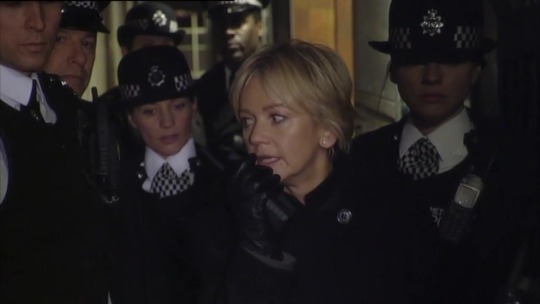
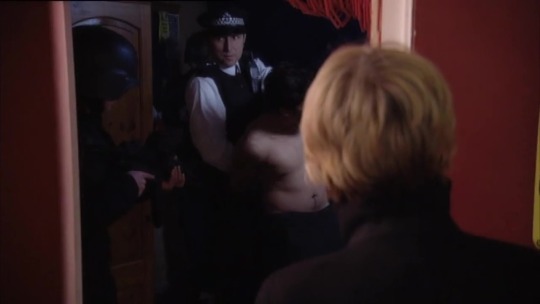



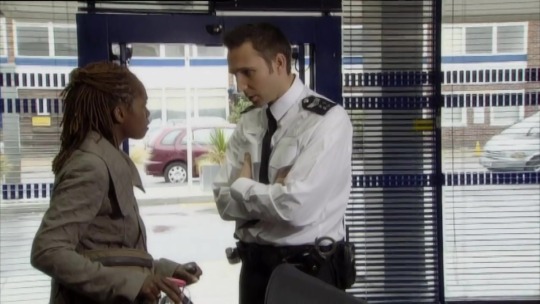
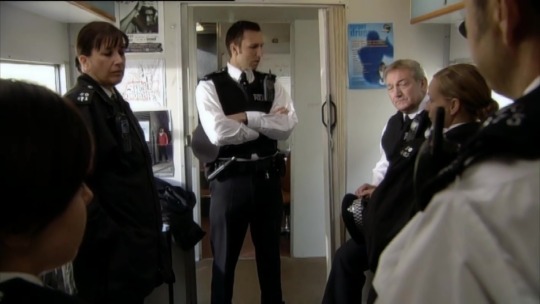

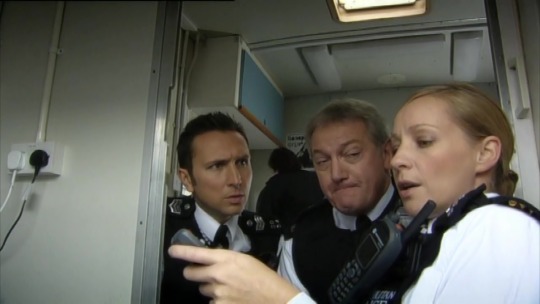

Max attends Beverley's house to talk to her about Dwayne. Although Dwayne is Brooke's dad, it's Leanne who is her guardian and who has custody. "He's my son!" "Carly was Leanne's daughter. Hasn't she suffered enough?" Max's reasoning works and Beverley confesses Dwayne wasn't home that night when she returned. He left Brooke home alone and told his mother he'd been to get Brooke some formula, but he wasn't carrying anything and there was plenty in the house. She can't tell him where they are now though.
Mark - Dwayne's boss - attends the station and tells Nate Dwayne has been in touch asking for a sub. He stalled him whilst he contacted them and Dwayne will call back in 15 minutes. Smithy suggests to meet at Mark's flat and Jo agrees. However, Dwayne suggests another place, the childrens area in Sherbourne Park. They agree to meet with Nate in the park Jo and Smithy in their cars observing. Mark gives the game away with a gesture to Nate. Dwayne realises and tries to run away, leaving Brooke behind but Smithy rugby tackles him (the editing isn't too great at this point and Alex clearly slips and falls and they cut out half way and have him leap again as shown below.) and cuffs him.

Brooke is returned to Leanne and Dwayne is brought in to the station.He wants to know who he has made the statement against him. He claims he has nothing to do with any gun, wouldn't shoot Carly as she's his daughters mother and that he ran because people he didn't know were chasing him. He insists he was at his mums with Brooke that night Carly died from 8.40pm until the morning. He tells them to ask his mum if they don't believe him. Grace tells him they did and she said he wasn't at home when she got back from work after 10pm. She helpfully adds 'you were at the shops?' and he nods but changes his mind when she asks which shop he went to. "Mum doesn't know I've started smoking... I nipped out for a cigarette.
Tito is tired and his solicitor keeps pushing for more breaks but they're keeping them to the legal minimum.Sam updates Tito that Dwayne has been arrested. They've also traced Tito having made a call to Dwayne that night. His solicitor insists that anyone could have made that call - perhaps Alesha did it.
Dwayne says he doesn't have Tito's number and the last time he saw or spoke to him was the funeral. Grace shows him a picture of the canal area that the gun was found and asks if he knows it. He says he doesn't. She shows him a picture of his shoes and asks if he recognises them. He admits they look like his trainers. Grace tells them they are his - and that they're limited edition. She goes on to confirm that the tread matches the footprint at the canal side where the 9mm gun was dumped. Dwayne looks at the picture again and suggests he could have gone there with Brooke to feed the ducks. As he's returned to the cells he can hear Tito kicking off.
Jo goes to Jack after having checked the whereabouts of Alesha's phone on the night of Carly's murder. She was lying when she said she was at Tito's. Her phone puts her at the scene. Sam and Jo arrest her for perverting the course of justice. Jo stresses she thought she understood the importance of telling the truth to get justice for Carly. Oscar loses his temper, telling her he brought her up to tell the truth. Sam tells her she has to tell them everything from the start.
Alesha now says she was walking home when a dark blue car with tinted windows pulled up alongside her. She couldn't see inside so kept walking until Tito called her name from the back seat. She got in beside him. Dwayne was there too and there was also a white youth approx 20 years old who was driving. Tito asked if she'd seen Carly and if she was still with Marlon by the skateboard park. She said yes and the car turned and drove back towards the park. She kept asking what they were doing and no one would answer her. Then Tito started telling Dwayne he was going to get Marlon. She asked to go home and they ignored her. Soon after they they started shooting out the windows and she was screaming and telling them to stop. She didn't want to see what was happening but she did see both Dwayne and Tito firing out the windows. She had no idea Carly had been hit.
Sun Hill need to protect Alesha and her dad at least until they find the unknown man. Also if they disclose a second statement to the defence they'll know that she lied the first time and lead the jury to not trust her evidence. Sam points out that they'll walk without Alesha's evidence as she is holding the entire case together so they have to go ahead, even with Jo pointing out that she will be torn apart by the defence counsel. Jack tells them to go over the statement again and make sure she clearly stresses why she withheld evidence the first time. They then ask her to look through pictures on the computer to see if she recognises the other boy. They explain that when she's done that they will be allowed to return home, but that there'll be a police officer with them at all times to keep them safe until they make an arrest.
Smithy is at Leanne's when he gets a call to update him about what has happened. Both Dwayne and Tito are being charged with Carly's murder. He then tells her that Alesha was in the car when Carly was shot. Leanne is shocked, not least because she spoke to her after and they cried together. She marches round to confront her with Smithy trying to stop her. However, Alesha approaches Leanne first and tells her how absolutely sorry she is and that she should have told her. Leanne's eyes fill with tears and she nods. Alesha squeezes her a very tiny smile and turns to head back to her dad and Nate as a car appears out of nowhere and knocks her down. Smithy runs after it to try stop it, pulling on the door as it slows to take a corner but it gets away (There's 4 adults and Alesha stood there, not one of them heard or saw it? It wasn't heard onscreen until it hit her and then you could hear normal engine noise as it sped away! They'd definitely have been able to hear it even if not see it approaching until it was too late 🤦🏻♀️)

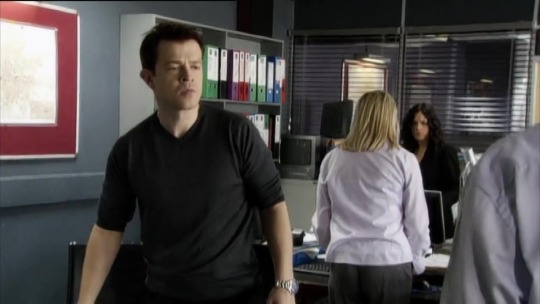
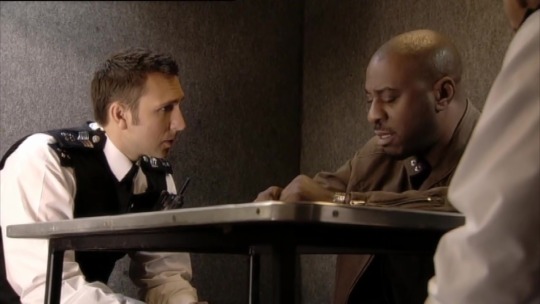
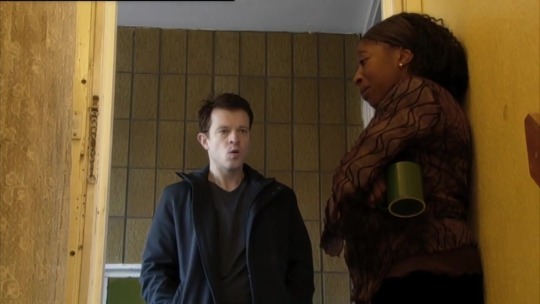
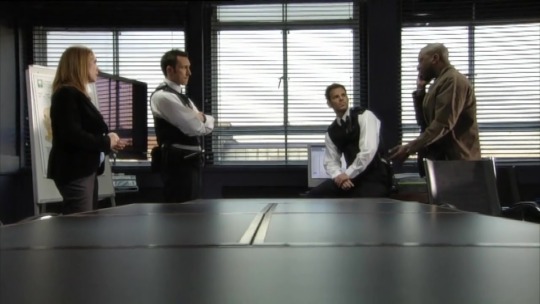
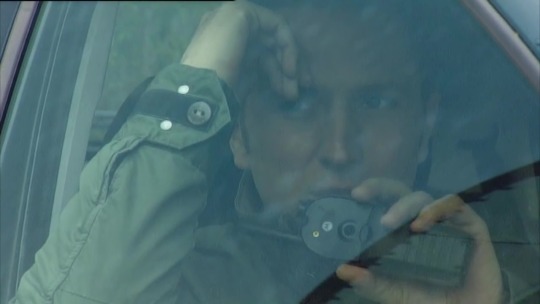

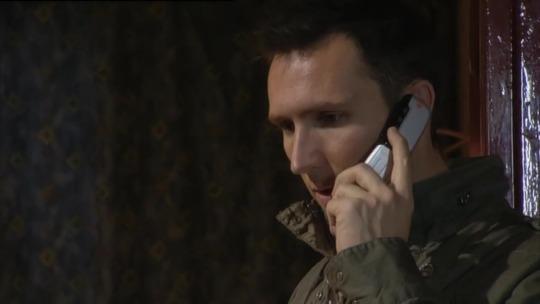


#witness 5#witness part 5#witness part 5 protection#protection#witness#the bill#alex walkinshaw#dale smith#smithy#smiffinalong#smiffina#lorna brown#leanne samuels#ben richards#nate roberts#jack meadows#simon rouse#sam nixon#lisa maxwell#jo masters#sally rogers
1 note
·
View note
Text

Hide your wallets, it's that time again! Your daily thread of romance deals is ready, $0.99 to $1.99!
$0.99 ✦ A Viscount for Christmas by Suzanna Medeiros
He returns home for a holiday house party, only to find his sister's best friend sleeping in his bed. The misunderstanding leads to scandal and a forced marriage.
Historical Romance (MF) | https://amzn.to/477s1v0
$0.99 ✦ A Knights Bridge Christmas by Carla Neggers
A single mom ready for a fresh start moves to a small town and becomes a librarian. He's a big city ER doctor in town to help out his grandma.
Contemporary Romance (MF) | https://amzn.to/46Yzuwl
$0.99 ✦ Christmas Angel by Jo Beverley
Women are constantly falling in love with him because of his charms, but he wants a marriage of convenience with a sensible woman, no love involved. She's a widowed mother.
KU Title
Historical Romance (MF) | https://amzn.to/41t0d3h
$1.99 ✦ Thank You, Next by Andie J. Christopher
She's a divorce attorney, he's an up-and-coming chef. They grew up together.
Contemporary Romance (MF) | https://amzn.to/48l1Odt
$1.99 ✦ The Shadows of Christmas Past by Christine Feehan, Susan Sizemore
2 books:
~ "Rugged womanizer" hero + a veterinarian who is rumored to cast spells
~ She rescued an injured wolf . . . only to have him turn into a man
Paranormal Romance (MF) | https://amzn.to/41tba4K
Putting these lists together takes time. If you appreciate this content, please consider buying me a Ko-Fi. http://ko-fi.com/danielletbq
0 notes
Text
Beverleyä haastateltiin ja hän puhui alkuperäisestä valinnastaan
Beverley täyttää tänä vuonna 35 vuotta. Tämän ikäiset pelaajat ovat uransa laskussa. Heidän on vaikea saada tunnustusta vahvoista joukkueista tässä iässä. Mutta hän voittaa silti monien fanien suosion ja käyttää NBA Pelipaidat taistellakseen. Mutta Beverley sai viime kaudella kutsun kahdelta joukkueelta, joista toinen on nykyinen Chicago Bulls ja toinen Golden State Warriors.
Beverley valitsi lopulta Chicago Bullsin molempien joukkueiden tarjousten jälkeen. Golden State Warriorsin kokoonpanosta tai maineesta riippumatta he ovat vahvempia kuin Chicago Bulls. Miksi Beverley valitsi lopulta Chicago Bullsin? Myös Beverley itse vastasi. Golden State Warriors toivoo, että hän voi odottaa ja nähdä joukkueen pelaajien vammat. Tällä alalla tai millä tahansa alalla, jos sinulla on mahdollisuus odottaa sinua, en usko, että on ketään normaalia ihmistä. Odottaa tilaisuutta, joka ei ole vielä täysin kypsä.
Odottaminen oli äkillinen muutos, ja se oli todellakin paras lopputulos Beverleylle tuolloin. Nyt kun Beverleyllä on Philadelphia 76ers pelipaita, nämä kaksi joukkuetta voivat olla vain kilpailijoita tällä kaudella. Odotamme innolla päivää, jolloin he kilpailevat.
0 notes
Text
God I fucking hate Jo Beverley. She apparently obsessed with making women fuck rapists and wife beaters, and then pretending those men are wonderful, swoon-worthy romantic heroes. Disgusting.
0 notes